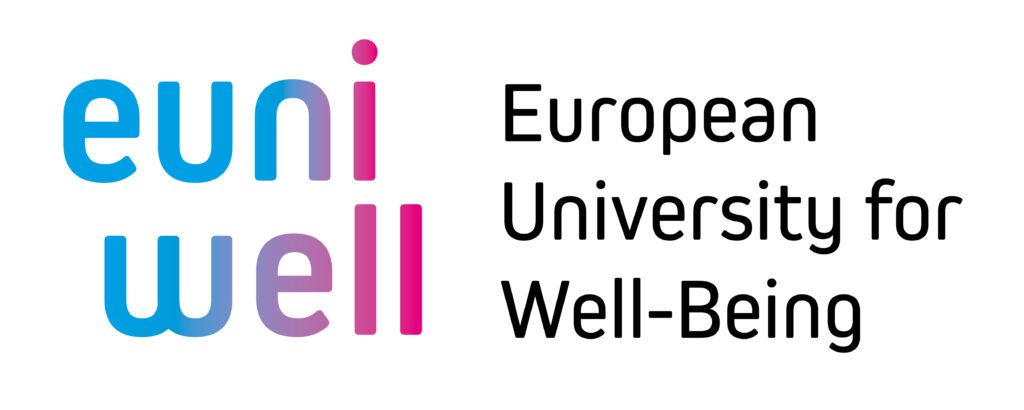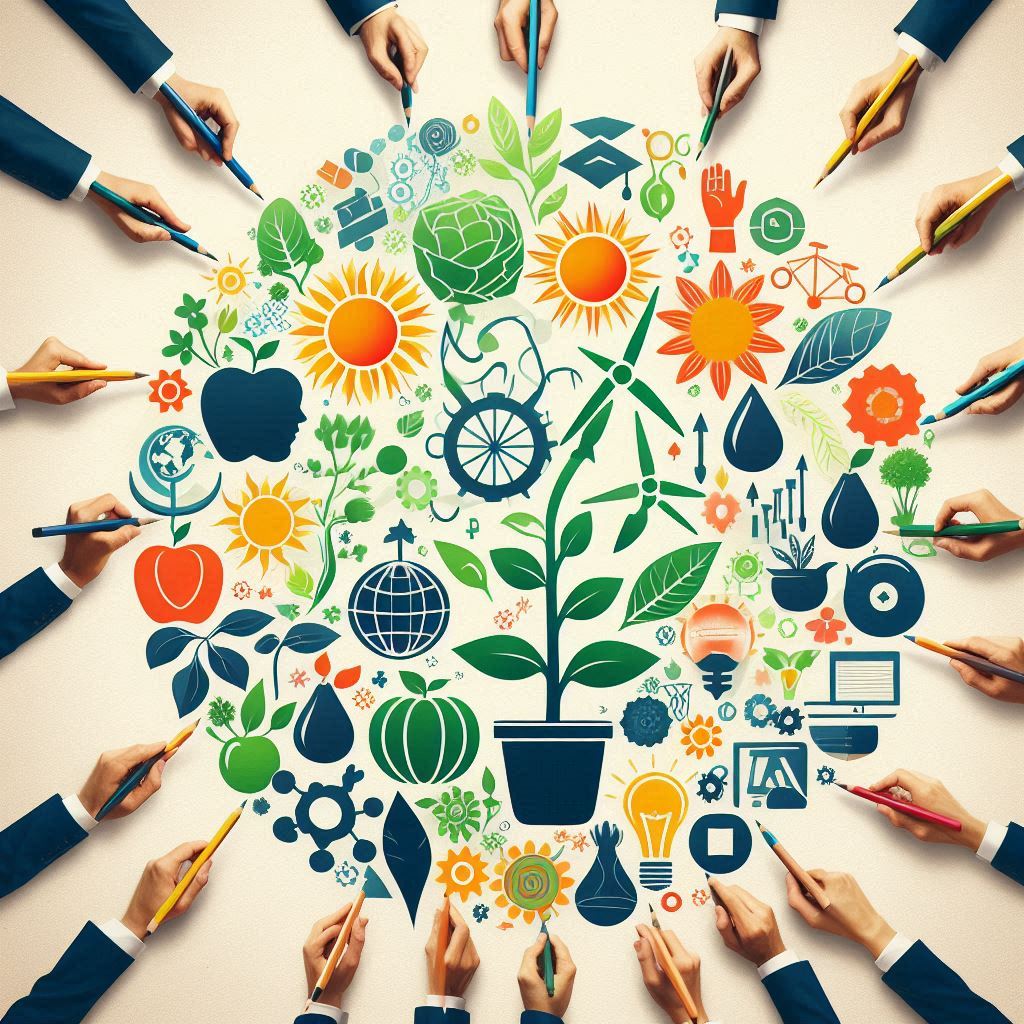Demos un paso al costado y reexaminemos la cuestión de por qué queremos una educación abierta. Y más concretamente, por qué la queremos en 2024, en el contexto de una alianza europea como EUniWell, y además en el contexto influido por lo que hemos aprendido durante la crisis de Covid y la llegada de la Inteligencia Artificial.
Todos conocemos la agenda de los ODS. Hay 17 Objetivos de Desarrollo Sostenible y todos están relacionados con el bienestar. Y creo que todos estamos de acuerdo en que no puede haber bienestar fuera de la sostenibilidad. Por eso quiero debatir y promover hoy la noción de una educación sostenible.
¿Una educación sostenible? ¿Qué es eso?
If we ask our new friend ChatGPT, we will get an answer in the form of “Sustainable Education, aka Education to the sustainable development goals, is…” And if we turn to our usual search engine we get more of the same.
This clearly is of interest and we all understand that a University should include such courses on «education to sustainable development». But this isn’t what we should call “sustainable education”.
So, what can sustainable education be? I believe that an education is sustainable when it has a durable effect. The French use the term Objectifs de développement durable or ODDs for SDGs. Let us follow their lead here.
For an education to be lasting we would expect that when a student leaves school or university, they have more than the diploma to vouch for their efforts.
Surely this is already the case! And I have not checked each individual university to be able to say otherwise. But I do know that since I have been talking about this, I have suffered little, if not no, contradiction.
Why is this important?
When we consider the effects of Artificial Intelligence, and more precisely of generative AI, we might see this is a great tool which can be used (and is already being used) to solve many situations of life: to help solve a problem, write a letter, test one’s language, check some facts… And we can imagine that we humans are going to want to use these tools through the knowledge and skills we have acquired up to now. Both in the moment of prompting -interacting with the algorithm- and interpreting the answers, we will be doing this safely if we can refer to what we have learnt.
Where are the learning supports?
When a student is enrolled in a class, they have access to the learning management platform (Moodle, Ilias,…) for this course. They will probably find the learning material, the notes provided by the teacher, the slides, links to extra material. They will use it during a semester. But what happens as soon as the student has taken the exam and validated the course? Inevitably, they will no longer have access to the learning material.
When we, as teachers, ask them to remember something they will have studied last year, they will essentially say that they haven’t seen this topic. When challenged, they actually don’t have any means to find the relevant information.
Obviously, a student can export the material from the LMS and organize their own portfolio. But they rarely do. And there are starting to be universities who archiving the courseware and allow to search in the past courses.
With textbooks, in most (non open) models, more of the same. Either the student has sold the textbook they have had to buy in order to pay for the textbooks of the new term, or they have benefitted from some system where the state has allowed them to borrow, for one year only, the relevant textbook.
The great job done by the libraries, of course, helps in part to make knowledge available to the many, but they are not a response on the long term (how many alumni will go back to their library for the missing information?)
In all cases the apparent hypothesis is that once the exam has been taken, there is no need to revisit one’s knowledge, to be able to check anything. Somehow, we all seem to believe, against all evidence, that what has been taught is in the brain forever.
Where has our educational knowledge disappeared to?
In fact, there are numerous explanations to this situation. As with many things, no direct decision was ever made to knowingly make knowledge vanish from physical supports. Call this «progress of technology». If we think about cultural knowledge like movies or music, we have seen, slowly but surely and over the past 50 years, the disappearance of records and videos, then of CDs and DVDs. Today, you hear a music you like, see a movie you enjoyed and don’t bother to think about safekeeping it for later. It’s on the cloud.
And following the same pattern, most students won’t preserve their educational knowledge for the future: it’s out there. On the cloud. But is it really?
Are exams becoming the goal of education?
As many teachers, I have depressing stories to tell, where at the end of my class, the students won’t ask me about some point I made but what the exam is going to be about or what is the relative coefficient of my course. When I have tried to avoid exams altogether and asked them to be there for the sole goal of learning, I have faced defeat. When the students infer that what I am talking about isn’t part of the evaluation, I have faced defeat.
In France, the system has moved from final exam based to «contrôle continu», which can be translated as «continuous evaluation» or as «continuous control». Preferred by the vast majority but it then becomes intrinsically impossible to separate the learning from the assessment.
This has some implications: by relating too hard the exam and the grades with the learning (how many parents of young children will ask in the evening “what have you learnt today?” and how many will ask “did you get any new grades?”) we are suggesting too strongly that education is about getting the grades and this encourages strategies which, with the help today of AI, allow to reach the grades without learning much.
Machine Learning as opposed or not to Human Learning
Machine Learning (ML) is at the core of Artificial Intelligence. Machine Learning typically -but not only- solves classification tasks: given some data, the ML algorithm builds a model that can be used to classify the data. For example, we may have students as data: some students have been successful (s) and others have failed (f). In the data, we know things about the students (their age, previous grades, …). The model will aim to take as input a new student, examine their grades and other values and predict s or f.
When an algorithm is chosen, an immediate question is: how good is it? Answering this is essential! It allows to compare algorithms, models, problems. So a metric is chosen. A simple one would be to count how many prediction errors are made over a test set. If we test over 100 students and get 3 misclassifications, the error rate will be 3%.
But now, something quite extraordinary happens: you can usually solve the new optimization problem instead. This problem is: Find the model which minimize the error rate. And to do this, typical algorithms will work on the partial derivatives of the function/model and solve the test of equations where these have to take value 0.
This works very well in practice, but notice that there is no learning here. Just the optimization of an error function.
This works well with AI, as we can see everyday. But surely human learning is different and is not about only minimizing the error function, or in other word getting high grades?
What about open education?
Open education has to be about solving these questions. Building collections of Open Educational Resources ensures that our students will have access to their knowledge after University. It will allow a new relationship between the students and alumni and the institutions. Finding alternative Open Educational Practices (OEP) may contribute to break the very wrong relationship installed between grading and learning.
These arguments don’t contradict tradition arguments in favour of open education: a cheaper access to knowledge, a setting in which the teacher enjoys more freedom and more responsibility, situations in which the youth are able to be more vocal about their future.
Open Education in EUniWell
The work program for the next four will allow us to discuss these questions. Furthermore, we want this discussion to be inclusive and accessible in all consortium languages. We have launched a few weeks ago our blog in that sense.
Next, we need to select some OER from the different member Universities in order to showcase them. Not only to prove that we have the capacity of building OER collections, but also to better understand what we are aiming to achieve.
The more complex task is to build a solution where we are able to share our learning materials. Between us and with the world. With experience, you learn that sharing is difficult. But the working group on Open Education in EUniWell are committed to this task.
Is this about well-being? We think so.

